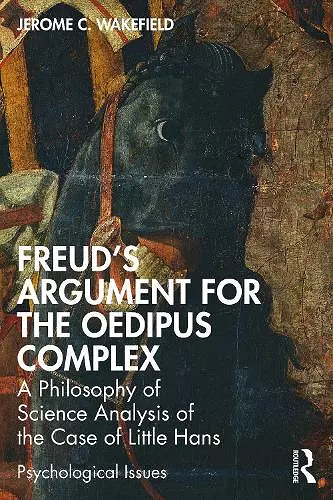Freud's Argument for the Oedipus Complex
A Philosophy of Science Analysis of the Case of Little Hans
Format:Paperback
Publisher:Taylor & Francis Ltd
Published:23rd Sep '22
Should be back in stock very soon
This paperback is available in another edition too:
- Hardback£135.00(9781032224053)

In this close reading of Freudian theory, Jerome C. Wakefield reconstructs Freud’s argument for the Oedipal theory of the psychoneuroses, placing the case of Little Hans into a philosophy-of-science context and critically rethinking the epistemological foundations of psychoanalysis.
Wakefield logically evaluates four central Freudian arguments: the "undirected anxiety" argument which contends that Hans suffered from anxiety before he developed his horse phobia; the "day the horse fell down" argument where, engaging in some scholarly detective work, Wakefield resolves a century-old dispute between behaviorists and psychoanalysts about when Hans witnessed a frightening horse accident; the "N=1 sexual repression" argument that the trajectory of Hans’s sexual desires matches the Oedipal theory’s predictions; and lastly, the "detailed symptom characteristics" argument that the Oedipal theory is needed to understand otherwise inexplicable details of Hans’s symptoms. Wakefield demonstrates that, although Freud’s arguments are brilliantly conceived, he misread the facts of the Hans case and failed to support the Oedipal theory as judged by his own stated evidential standards. However, this failure creates an opportunity for renewed consideration of psychoanalysis’s distinctive contribution: the understanding of an individual’s unique meaning system and confrontation with meanings outside of focal awareness in order to reshape an individual’s fate.
This book will be of interest to psychoanalysts and psychotherapists alike, and will prove essential for scholars working in the fields of psychoanalysis, philosophy of science, and the history of psychiatry.
'This book is a major work from a unique philosophy of science perspective. Wakefield traces Freud's reasoning and theoretical motives in proposing the theory of the Oedipus complex. He demonstrates with his usual lucidity that Freud's formulations of infantile sexuality and Oedipal theory represented efforts to rescue the core proposition of the sexual theory of the neuroses following the failure of the seduction theory. Wakefield's analysis of the logic and pattern of Freud's thinking and reasoning is unmatched by anything I have read in the area of Freud scholarship. It is as if the reader has occupied Freud's mind and is privy to the sequence and pattern of his thoughts. An additional virtue of the book is that even if that is not its intention, it speaks to a long-standing barrier between clinicians, on the one hand, and theorists and researchers, on the other. Wakefield's analysis of Freud's reasoning and use of clinical data is unmatched in its lucidity and cogency. It serves as a model for a meaningful discussion of the use of clinical data in theory building. For anyone interested in bridging the gap between clinical practice and theory in psychoanalysis, this book is a must-read.'
Morris Eagleis professor emeritus at the Derner Institute for Advanced Psychological Studies, Adelphi University, and author of Toward a Unified Psychoanalytic Theory: Foundation in a Revised and Expanded Ego Psychology
'Wakefield offers not only a logical reconstruction of the Oedipal theory, based on the case history of Little Hans—Freud's paradigm for positive Oedipus complex—but also a performative analysis of this theory, aiming to explain why it was accepted in the absence of sufficient evidential support. The impact of the Oedipal theory is described as enforcing a new form of regulation and restraint of the affection between mother and son, consistent with the direction in which marital relations were being restructured early in the twentieth century... Structured as it is in a sequence of stringent arguments, Wakefield's thesis is fascinating and persuasive. Its rare merit is that it makes the reader think.'
Carlo Bonomi, PhD, is a training and supervising analyst of the Società Italiana di Psicoanalisi Sándor Ferenczi. To read this review in full please visit: Is the Oedipus complex an iatrogenic theory? Book essay on Jerome C. Wakefield, Freud’s Argument for the Oedipus Complex: A Philosophy of Science Analysis of the Case of Little Hans (Routledge, 2023) and Attachment, Sexuality, Power: Oedipal Theory as Regulator of Family Affection in Freud’s Case of Little Hans (Routledge, 2023), International Forum of Psychoanalysis, DOI: 10.1080/0803706X.2023.2273784
ISBN: 9781032224084
Dimensions: unknown
Weight: 540g
286 pages